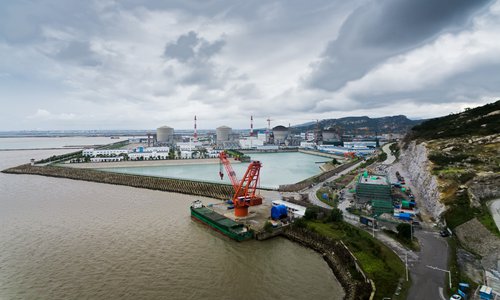
An overview of the Tianwan Nuclear Plant in East China's Jiangsu Province Photo: VCG
China has made progress on liquid metal coolants for nuclear reactors, a key technological breakthrough in developing domestic nuclear energy.
The liquid lithium loop system has operated safely at ultra-high temperatures of 1,500 K, equivalent to 1,227 C, in a laboratory by the Chinese Academy of Sciences' Institute of Nuclear Energy Safety Technology, the People's Daily reported on Monday.
The research team, based in Hefei, East China's Anhui Province, has overcome the obstacles of stress coordination and immersive measurements in liquid lithium. The fluid's stability has also been controlled, the newspaper reported.
There is still long way to go to apply the technology, an expert on nuclear engineering who requested anonymity told the Global Times on Monday.
Liquid lithium is an ideal material to derive heat from nuclear fusion reactors for its high working temperature, good thermal conductivity and low density. Able to work under normal pressure, lithium coolants can make the reactor compact and lightweight, the newspaper reported.
Lithium working at high temperatures will be suitable for space reactors while current power-yielding reactors only require a temperature of around 500K, the expert said.
The circuit has carried out experiments on the corrosion resistance of refractory alloys in superheated lithium liquid. Such a stable loop system is the basic platform for future research on the compatibility between liquid lithium and structural materials, People's Daily reported.
China's second and third generation reactors rely on imported technology. This breakthrough is one steady step to nuclear independence, Lin Boqiang, director of the China Center for Energy Economics Research at Xiamen University, told the Global Times on Monday.
